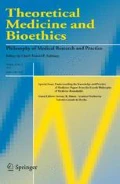Abstract
Three arguments of Habermas against “liberal eugenics”—the arguments from consent, responsibility, and instrumentalization—are critically evaluated and explicated in the light of his discourse ethics and social theory. It is argued that these arguments move partly at a too deep level and are in part too individualistic and psychological to sufficiently counter the liberal position that he sets out to criticize. This is also due to limitations that prevent discourse ethics from connecting effectively to the moral and political domains, e.g., through a discussion of justice. In spite of these weaknesses, Habermas’s thesis is of major relevance and brings up neglected issues in the discussion about eugenic reproductive practices. This relevance has not been duly recognized in bioethics, largely because of the depth of his speculations of philosophical anthropology. It is argued that Habermas’s notion of the colonization of the lifeworld could provide the analytical tool needed to build that bridge to the moral and political domain.
Similar content being viewed by others
Notes
The term “libertarian” would be more appropriate than “liberal” for this reproductive policy because of the strong laissez faire emphasis of its proponents which is in sharp contrast with political liberalism.
For a detailed discussion of this distinction, see [10, ch. 4].
References
Habermas, Jürgen. 2003. The future of human nature. Trans. H. Beister, M. Pensky, and W. Rehg. Cambridge: Polity Press. Originally published as Die Zukunft der menschlichen Natur: Auf dem Weg zur einer liberalen Eugenik (Frankfurt am Main: Suhrkamp, 2001).
Harris, John. 2005. No sex selection please, we’re British. Journal of Medical Ethics 31: 286–288.
Häyry, Matti. 2010. Rationality and the genetic challenge: Making people better? Cambridge: Cambridge University Press.
Árnason, Vilhjálmur. 2011. Nonconfrontational rationality or critical reasoning. Cambridge Quarterly of Health Care Ethics 20: 228–237.
Habermas, Jürgen. 1990. Discourse ethics: Notes on a program of philosophical justification. In Moral consciousness and communicative action, Trans. C. Lenhardt and S.W. Nicholsen. Introd. by T. McCarthy, 43–115. Cambridge: Polity Press.
Habermas, Jürgen. 1993. On the pragmatic, the ethical and the moral employments of practical reason. In Justification and application, Trans. and Introd. by C. Cronin. 1–17. Cambridge: Polity Press.
Rawls, John. 1971. A theory of justice. Oxford: Oxford University Press.
Agar, Nicholas. 1999. Liberal eugenics. In Bioethics, ed. Helga Kuhse and Peter Singer, 171–181. Oxford: Blackwell.
O’Neill, Onora. 2002. ‘Reproductive autonomy’ and the new technologies. In Autonomy and trust in bioethics, 49–72. Cambridge: Cambridge University Press.
Buchanan, Allen, Dan Brock, Norman Daniels, and Daniel Wikler. 2000. From chance to choice: Genetics and justice. New York: Cambridge University Press.
Norman, Daniels. 1985. Just health care. Oxford: Oxford University Press.
Selgelid, Michael J. 2014. Moderate eugenics and human enhancement. Medicine, Health Care and Philosophy 17: 3–12.
Anderson, Joel. 2005. Review of The future of human nature, by Jürgen Habermas. Ethics 115: 816–821.
Habermas, Jürgen. 1990. Morality and ethical life: Does Hegel’s critique of Kant apply to discourse ethics? In Moral consciousness and communicative action, 195–215. Cambridge: Polity Press.
Sartre, Jean-Paul. 1957. Existentialism and human emotions. New York: The Wisdom Library.
Merleau-Ponty, Maurice. 1962. The phenomenology of perception. London: Routledge and Kegan Paul.
Prusak, Bernard G. 2005. Rethinking “liberal eugenics”: Reflections and questions on Habermas on Bioethics. Hastings Center Report 31: 31–42.
Vetlesen, Arne Johan. 2003. Introd. to Den menneskelige naturs fremtid, by Jürgen Habermas, trans. L. Holm-Hansen and Ø. Skar. Oslo: N.W. Damm & Sön. Originally published as Die Zukunft der menschlichen Natur: Auf dem Weg zur einer liberalen Eugenik (Frankfurt am Main: Suhrkamp, 2001).
Davis, Dena S. 2001. Genetic dilemmas: Reproductive technology, parental choices, and children’s futures. New York: Routledge.
Ehni, Hans-Jörg, and Diana Aurenque. 2012. On moral enhancement from a Habermasian perspective. Cambridge Quarterly of Health Care Ethics 21: 223–234.
Habermas, Jürgen. 1987. The theory of communicative action. Vol. 2. Trans. Thomas McCarthy. Boston: Beacon Press.
Jütten, Timo. 2001. The colonization thesis: Habermas on reification. International Journal of Philosophical Studies 19: 701–727.
Wiesemann, Claudia. 2006. Von der Verantwortung, ein Kind zu bekommen: Eine Ethik der Elternschaft. München: C.H. Beck.
Acknowledgments
An earlier draft of this paper entitled “Genetic Fairness: Political, not Anthropological” was read at an international bioethics workshop, Habermasian bioethics: A new paradigm? At the University of The West of Scotland, Paisley Campus, in May 2011. A draft of this paper was read at a department seminar of the Institute of Philosophy, University of Bergen, in November 2013. I thank the Institute for research facilities while the paper was written and the University of Iceland for funding my sabbatical. I also thank Páll Skúlason and Jørgen Pedersen for helpful comments on the manuscript.
Author information
Authors and Affiliations
Corresponding author
Rights and permissions
About this article
Cite this article
Árnason, V. From species ethics to social concerns: Habermas’s critique of “liberal eugenics” evaluated. Theor Med Bioeth 35, 353–367 (2014). https://doi.org/10.1007/s11017-014-9308-2
Published:
Issue Date:
DOI: https://doi.org/10.1007/s11017-014-9308-2




